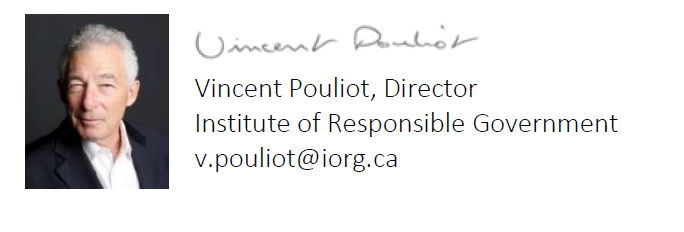A text by Vincent Pouliot, Director of the Institute of Responsible Government, Canada
Do you want to change the world? Restore democracy? Radically improve government? Help us complete the design of an incorruptible model of government that aligns the ambitions of those in power with the ambitions of the people.
Abstract of a research agenda
It requires no great powers of observation to see that there is a widespread tendency for governments to abuse their power. Unfortunately, this abuse is deeply rooted in human nature. Human beings seek to fulfill their needs at the least cost. We naturally specialize and exchange our efforts to fulfill our needs more economically. The State of Nature, however, permits us to take what we want through aggression. To ensure a civil society, citizens naturally confide their power in a higher authority. This higher authority, however, is composed of human beings driven by this same instinct. What prevents the operation of this instinct from driving our government to exercise the powers of the state to its own advantage?
This conundrum has impeded humanity’s well-being from the beginning of time.
Montesquieu suggested that the means to prevent this abuse of power is structural, through the separation of powers so “that power should be a check to power.” Meanwhile, the British courts conceived the notions of authority and constitutional representation.
A model and system of government designed to prevent the abuse of power
Following the insurrections of British Upper Canada and French Lower Canada against their abusive colonial governments, they were united in 1840 under one government to create the Province of Canada. Both were entitled to the same number of representatives in their united legislature. The people were determined to set up a government that would be accountable for its exercise of the powers of the state. What they achieved was an almost perfectly balanced, self-correcting federal system that ensured the rule of government in accordance with the well-understood wishes and interests of the people.
It was characterized by a coalition government formed and directed by two prime ministers who were the leaders of Upper and Lower Canada sitting in the Governor’s council as his chief advisers. This political structure harnessed the human nature of those in power to align their ambitions with those of the people.
An injustice arose because of the operation of this Responsible Federalism within a unitary state. The Fathers of Confederation proposed to renew its operation within a constitutionally balanced bicameral Parliament wherein all provincial political parties would be fairly represented in the Upper House. This intent was loyally drawn up in Canada’s Constitution Act, but it was set aside in its implementation.
Our ambition is to fully conceptualize the adaptation of this Responsible Federalism to the proposed balanced bicameral parliament. We believe that such a system of government could liberate the people from tyranny to allow humankind to flourish in all its potential.
We are hoping to involve members of the SG on Parliaments in pursuing this goal. We have written a number of papers since initiating our research in 1997. In 2018, we put it all together in one paper which we presented to the Canadian Political Science Association [here]. Since then, we have concentrated on outlining the operation of the checks and balances naturally arising within its operation [here].
The task at hand now is to test the model through iterative simulation. It is to test the outcome against expectations and, if deemed necessary, to conceive, implement and verify practices designed to ensure that that this parliamentary government remains constitutional, respectful of the law, and in the service of the people.


